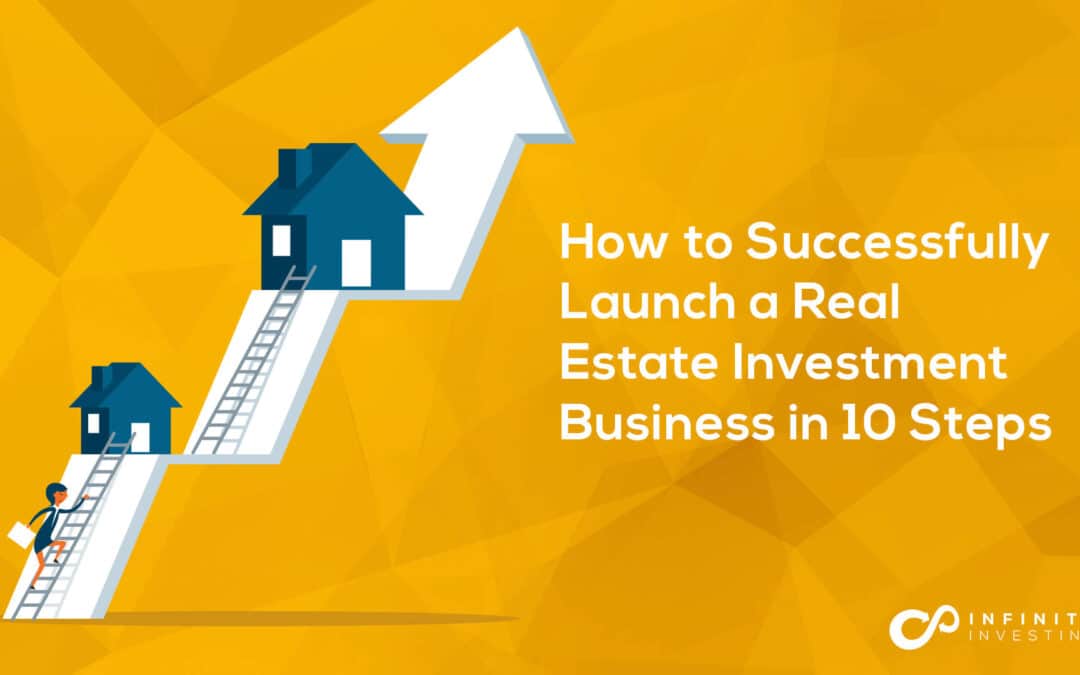
Starting a real estate investment business can be a great way to earn more money, whether through rental income, appreciation, or development. But where do you start? Knowing what factors to consider and how to start your business can help you find long-term success. Read this informative 10-step guide to learn how you can launch your own real estate investment business.
Key Takeaways
- There are various options for real estate investments, including residential, commercial, and rental properties and house flipping.
- A solid business plan that reflects your goals and budget can guide your real estate investments.
- Other factors to consider when launching a real estate investment business include taxes, state regulations for business operations, and insurance policies.
- Creating a marketing plan and networking with other real estate professionals may help you find potential real estate investments.
Infinity Investing Featured Event
In this FREE event you’ll discover how the top 1% use little-known “compounders” to grow & protect their reserves. Our Infinity team of experts show you how to be the best possible steward of your finances and how to make your money and investments work for you instead of you working for them. Regardless of your financial situation today, you’ll have a road map to get to where you want to be.
1. Familiarize Yourself With Real Estate
Before you start, familiarize yourself with the real estate market and investment opportunities. Research the location where you want to invest to learn about median home values, rental prices, and neighborhoods. You can use widely available resources, such as books, articles, blogs, online videos, and podcasts, to learn about real estate investment. It may also be helpful to find other investors who can discuss their own experiences with you. They may have advice about how to start or where to find potential investments.
As you research, some key factors to consider before launching your business include:
- Risks: Like all types of investments, real estate comes with potential risks. These may include expensive repairs, losses in value, or downturns in the real estate market. Determine risk management strategies you can implement to improve your investment outcomes.
- Taxes: Learn more about real estate taxes so you understand what you might owe on your investments. Research types of properties to determine the deductions and benefits you’ll earn from your investments.
2. Choose a Real Estate Investment Model
You have many options for investing in real estate. Consider your business goals as you decide which investment model to pursue. By choosing a model, you can determine the tools and resources you need to assemble before you start your business. Some common types of real estate investment models include:
- Commercial or residential investments for homes and businesses.
- Rental properties, where you manage tenants who live at the property.
- Flipping homes to renovate properties and sell them for a profit.
- Buy-and-hold real estate, where you invest in a property and hold it for a period of time so it appreciates.
- Wholesaling, where you put a property under contract and find an investor to purchase it.
- Passive investments, such as turnkey rentals.
3. Make a Business Plan
After determining the investment model you want to use, prepare your business strategy and write a business plan. In your plan, establish your investment goals. Use the SMART method to identify specific, measurable, achievable, realistic, and timely goals, which can help guide your planning. Also, include your finances, marketing strategy, and resources in your business plan. For example, if you plan to flip houses, determine the types of homes you want to purchase, how you can finance them, and how much you want to make in returns.
4. Set up a Business Structure
Make sure you set up a business structure to comply with legal requirements in your state. Some common business structures of real estate investment businesses include partnerships, corporations, and limited liability companies, or LLCs. Most structures involve choosing a business name, establishing an operating agreement, and getting a tax identification number. Depending on where you live, you may also have to secure permits before you can start your business. Consider working with an attorney who can assist you with choosing a business structure and completing the requirements to operate in your state.
5. Prepare a Budget
Once you’ve made a plan and established a structure for your business, prepare an investment budget. Allow for all investment costs, which may include purchasing, inspections, and renovations. Also determine your monthly expenses, such as taxes and mortgage payments, and monthly revenues, like rental income or appreciation.
Unless you plan to purchase real estate in cash, secure financing for the initial costs, including a down payment and repairs. You can get a traditional loan through the government or a financial institution, or you can look into other financing options, such as private lenders or crowdfunding. Research various loans and other financing options to choose the one that best fits your investment goals and budget.

6. Purchase the Right Insurance
Depending on your business plan and structure, you might need to carry different types of insurance. Since these requirements can vary widely, it’s best to consult with an attorney or insurance agent who specializes in real estate. Some policies you may need to purchase include:
- Professional liability.
- Landlord insurance.
- A business owner’s policy.
- Commercial vehicle insurance.
- Home-based business insurance.
7. Build a Team
Many beginning real estate investors choose to earn a real estate license. While you don’t need this to invest in real estate, a license will allow you to access the multiple listing service (MLS), where you can search for potential investments. You can also join a professional organization such as the National Association of Realtors, which may increase the leads you receive. Check with your state’s real estate commission about the specific steps and requirements to earn a license.
Even if you choose to earn your license, it may be worth building a team of professionals who can assist you with tasks that are outside your scope of expertise. Your team members may include:
- A real estate agent.
- An appraiser.
- A home inspector.
- A lawyer or attorney.
- An accountant.
- A maintenance person.
- A contractor.
8. Market Your Business
Create a marketing campaign to increase the leads you get for potential real estate investments. Create a website to describe your business. There are various web content management systems you can use that are just right for beginners. Once you have a website, include a link on your various marketing materials, such as brochures or handouts. Make sure you create a presence on social media sites so you can reach your target audience. Other marketing tools you might use include email newsletters, direct mail, and in-person events.
9. Network With Others
While you can certainly build a real estate investment business on your own, it helps to have people you can turn to for advice or answers. Network with others in the real estate industry to gain knowledge from people who have been in business longer than you. Join a local real estate group or become part of a national organization that has a chapter in your area. Attend real estate events, workshops, and conferences to meet others. Spend time fostering relationships so you build a quality network of people who can help you be successful.
10. Find Potential Real Estate Investments
After all your hard work to establish your business, it’s time to find potential real estate investments. You can use the MLS to find properties in your area, as well as websites that have real estate listings. Focus your search on the type of properties you’ve identified in your business plan.
For example, if you want to invest in short-term rental properties, such as Airbnbs, you may look at condos or single-family homes in popular areas of town, close to attractions and amenities. Additionally, keep your budget in mind as you search for real estate so you only consider properties you can afford.
Learn More About Investing in Real Estate with Infinity Investing
Starting your own real estate investment business can be an exciting and rewarding adventure. Successful real estate investments can lead to significant returns, especially over time. Do you have more questions about how to get your start in real estate investing? Sign up for a free or paid Infinity Investing membership. Your membership offers access to a wide range of resources, such as weekly stock tips and investment workshops. You can use these tools as you build your real estate investment business.
Infinity Investing Featured Event
In this FREE event you’ll discover how the top 1% use little-known “compounders” to grow & protect their reserves. Our Infinity team of experts show you how to be the best possible steward of your finances and how to make your money and investments work for you instead of you working for them. Regardless of your financial situation today, you’ll have a road map to get to where you want to be.

